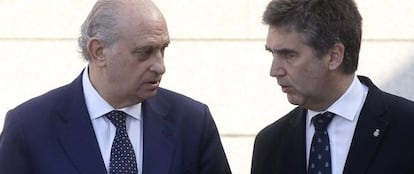Riot squad chief in Madrid fired over failure to contain Dignity March violence
Poor coordination contributed to injury count of over 100, head of National Police tells Congress

The head of the National Police riot squad in Madrid is to be relieved of his duties over the failures that occurred during the March 22 Dignity March protests in the capital, which ended in violence. Over 100 people were injured – 67 of them law enforcement officers – after a group of participants began ripping up paving stones and hurling them at riot police during the anti-government demonstrations.
Ignacio Cosidó, director general of the National Police, told Congress on Wednesday that Francisco Javier Virseda, head of the First Police Intervention Unit (UIP), would be replaced “over the unacceptable number of wounded officers” at the marches. There would also be a restructuring of all police services so as to better deal with a possible rise in street violence caused by radical groups, he said.
The National Police chief admitted there had been poor coordination and communication during an operation that deployed a record 1,650 riot officers, as well as members of the Civil Guard and municipal police, to control a crowd of tens of thousands out to protest austerity measures and other government policies.
“There was an escalation of violence such as had never been witnessed before”
Not only would there be a restructuring of the different police units, Cosidó said, but there are also plans to improve coordination by making the Coordination Center (CECOR) the sole command post. Officers would also be provided with better equipment, he added.
Cosidó also told Congress that even though the vast majority of the demonstrators were peaceful, between 30 and 40 radical groups had infiltrated the march, including some with a long record of street violence, such as Bukaneros, Yesca and the Brigada 13 de Noviembre. The total number of violent protestors was around 1,500, police sources said.
“There was an escalation of violence such as had never been witnessed before, and we had never faced before,” said Cosidó.
Some of these violent protestors, many of whom have ties to radical nationalism, reportedly used catapults to fire steel balls at the legs of riot police, which sent officers falling to the ground. In one case, a group of protestors beat a riot police chief until he collapsed. The group is reported to have kicked off his protective helmet, and one individual is accused of having thrown a large rock at the officer’s head. Despite being half conscious, the officer managed to move his head and avoid the full impact. Miguel M.S., 21, is being charged with attempted murder.
Cosidó said police action had been guided by balancing the use of force with respect for citizen rights and civil liberties. He also noted that in the 25,461 demonstrations held across Spain over the last year, the police only intervened on 23 occasions.
“Those who forecast rising street violence because of the crisis were wrong,” he said.
Tu suscripción se está usando en otro dispositivo
¿Quieres añadir otro usuario a tu suscripción?
Si continúas leyendo en este dispositivo, no se podrá leer en el otro.
FlechaTu suscripción se está usando en otro dispositivo y solo puedes acceder a EL PAÍS desde un dispositivo a la vez.
Si quieres compartir tu cuenta, cambia tu suscripción a la modalidad Premium, así podrás añadir otro usuario. Cada uno accederá con su propia cuenta de email, lo que os permitirá personalizar vuestra experiencia en EL PAÍS.
¿Tienes una suscripción de empresa? Accede aquí para contratar más cuentas.
En el caso de no saber quién está usando tu cuenta, te recomendamos cambiar tu contraseña aquí.
Si decides continuar compartiendo tu cuenta, este mensaje se mostrará en tu dispositivo y en el de la otra persona que está usando tu cuenta de forma indefinida, afectando a tu experiencia de lectura. Puedes consultar aquí los términos y condiciones de la suscripción digital.









































